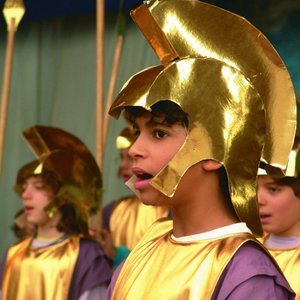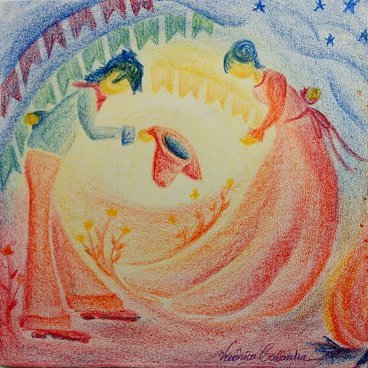[print-me target="body"]
play by Ruth Salles
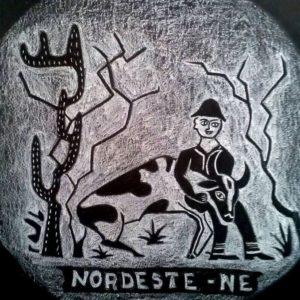
Blackboard drawing by Verônica Calandra Martins.
This piece is mainly based on a collage of excerpts from the poems “Brasil” and “Europeu”, by the Brazilian poet Ronald de Carvalho¹, and was made from the study of Geography, or rather, to illustrate this matter. Ronald de Carvalho, despite always being focused on European culture, by joining the Modernist Movement “discovers America”, “listens to the voices of the land”. Its wide and free rhythms give the measure of the new continent of immense dimensions. The sound of his words recalls long and firm steps, verses spread out like the vast horizons of a pathfinder. This piece, as it includes the difference between the cowboys of the south and the northeast, also contains a small excerpt from “Correr Eguada”, a short story by the gaucho writer Simões Lopes Neto², and the poem “A Pega do Boi”, by the Pernambuco poet Ascenso. Ferreira.
The latter narrates the magpie of the ox in a skirt, that is, by the tail, as is used in the northeast; the dialogue of the gauchos in “Correr Eguada”, in turn, shows what the ox magpie is like in the south, through the use of the bola. I leave it to the teacher to choose a gaucho dance and a northeastern dance. In the end, there is a vocabulary of regional words and notes about the difference between the southern and northern cowboys, notes that I took to orient myself and that can be useful for the teacher³. I wrote a previous conversation between a cowboy from the south and one from the northeast so that some terms can be better explained.
CHARACTERS:
Choir of gauchos and gaúchas on one side, northeast and northeast on the other. A gaucho cowboy and a northeastern man stand out from the choir and meet.
GAÚCHO (takes two steps back in astonishment):
– Hey, bye! What are you doing there all dressed up?
leather like you were a giant boot?
NORTHEAST:
- Ah, come closer. Don't be afraid!
This is to face the dry caatinga of the sertão of my northeast.
There are only thorn plants: facheiro, mandacaru.
Can't you see my mount? (points) That skinny fourth over there?
In addition to a goatskin blanket, it also has a breastplate and knee pad.
GAUCHO (nods, thinking):
- Hmm… hm…
NORTHEAST:
– Even more so if my ox strays and I have
to run after and make the skirt catch!
GAUCHO:
– Barbarity! You mean that even the ox
wear knitwear and at the time you wear a skirt?
NORTHEAST:
– Ara, you blessed… Ox that strays is ox that runs away, and its tail comes out.
I run after him, grab his tail with a tug, he falls, and so do I.
But what about you, all handsome, where are you from, and where do you come from?
GAUCHO:
– I am from the southern pampas, with a vast horizon, where there are no thorns.
And I come from want, from my payment where I left my gift.
NORTHEAST:
– Is it? Here, if you want, you also pay a gift at the church.
GAUCHO:
– Barbarity, man! Paid and Querência is where I was born. Gift is my girlfriend.
NORTHEAST:
- Hmm…! And that rope in your hand is what, young man?
GAUCHO:
– Eh, tchê, it's the rope of my bola.
(shakes noose with balls to show)
I'm a baller.
NORTHEAST (scratches his head, as if he doesn't understand):
- IT'S?
GAUCHO:
– With the bola I run after my haragano bagual…
NORTHEAST:
- IT'S?
GAUCHO:
- Then I throw the bola, it wraps itself around your legs and that's it.
NORTHEAST:
– And what is this bagual so-and-so?
GAUCHO:
– Haragano is a young, skittish horse that shoots. The boleador must be torena.
NORTHEAST:
– Torena looks like the bull woman.
GAUCHO:
– Ara, tchê, torena is the strong gaucho who runs after the mare in the japonal.
NORTHEAST:
– And what does the Japanese have to do with it?
GAUCHO:
– What Japanese? Japonal is the terrain where the mare runs.
NORTHEAST:
– Mare and horse.
GAUCHO:
– Yeah, yeah, yeah. Barbarity!
NORTHEAST:
– Ah, you blessed… (the two return to the chorus.)
CHORUS (CR):
“- In this hour of pure sun
clapping still
polished stones
clarities
sparks
flickers
I hear the huge singing of Brazil!”
GAÚCHOS AND GAÚCHAS (RC):
“- Ah!
the riots of our tempered blood
in jumps and shots over pampas…
silly herds…
hoofbeats, stomping feet,
whirlwind of horns!
Virgin joy of the turns that the noose gives
on the green thigh...
Joy of creating the way
with the sole of the foot!”
(At this point, the gauchos sing a song like “O Carreteiro” or “Prenda Minha”; then three stand out from the chorus saying excerpts from a gaucho conversation, by Simões Lopes Neto.)
1st GAÚCHO (SLN):
“– Ah!… There is nothing like drinking mate and
run flat! It was always fun
macanudo a flurry of baguals!”
2nd GAÚCHO (for the 1st):
“– In Major Jordão's fields, I once entered into a riot.
There were like ten thousand baguals, cavalhadas started, which all became haragana, in japonais.
One fine day the major decided to clean up that raised bug.”
3rd GAÚCHO (also for 1st):
"- Friend! When it was three days before the new moon, the estancia was crowded with gauchada.
With some eighty-odd torenas, twisted campeiros, tamers and ballers of fame.”
2nd GAÚCHO (poking the 3rd with his elbow):
“– The campeiros came arriving and the baguada of each querência was being played.
Gradually, the rodeo grew, thickening, and suddenly it would shoot out, roaring through the air like a thunderclap.”
3rd GAÚCHO (still facing the 1st):
“– So the real fun began!
You ran without stopping, six, ten, twelve leagues... and at the end you were a leaflet!”
2º GAÚCHO (making the boleador gesture):
“– Each gaucho would roll the bagual that he liked the most;
the shots of balls crossed each other in the air... and the bagual soon rotated, in the tangle of the ropes.”
1st GAÚCHO:
“- Barbarity! There's nothing like drinking mate and running around! Oh, time…”
(At this point, gauchos and gaúchas stand out and dance. Then they return to the choir, which continues.)
CHORUS (CR):
– In this hour of pure sun
I hear the huge singing of Brazil!
NORTHEASTERN (RC):
“– I hear the earth that crackles
in the hot belly of the northeast,
… the land that crumbles
and rolls in deaf balls...
and breaks into dry crusts,
roasted in Crato chato;
I hear the sizzle of the caatingas
– trills, chirps, trills, whistles, hums,
stinging beaks, puffing puffs,
wings that zine, zine, zine,
cricris, cicios, schisms, long schisms,
langues – caatingas under the sky!”
(At this point, Northeasterners and Northeasterners sing Ascenso Ferreira's poem, “A Pega do Boi.” Then they dance the baião. Or they dance, then sing.)
NORTHEASTERN (AF) (sing):
“The strayed beast
heard in the ravine
sound the tune
from someone who aboido:
Ho-ho-ho-ho-ho-ho-ho!
Go!
My ox surubim...
Ox!
Boy!
and then amazed
feeling the loop
in the bush it emptied…
behind the cowboy
riding sailboat
also dove…
The hooves in the stones
took every risk
like the lightning
night in the sky…
jumped ditches,
eighties rose,
stepped on facheiros
and mandacarus…
At last…
At the Jatobá do Catolé
right next to an oiticoró tree
already from Exu in the direction…
the tail of the queer held in the hand!
Damned dust and two figures on the floor.
But dust off,
the cow mandigueira
on the ground it was…
And a cry of glory in space vibrated:
Ho-ho-ho-ho-ho-ho-ho!
Go!
My ox surubim...
Ox!
Boy!”
(After the singing and dancing, everyone forms behind again to finish the chorus.)
CHORUS (CR):
“– I hear the troop of Iguaçu horses…
tapping with water paws
in the morning of bubbles and green drops;
I hear your deep melody,… Amazons,
the melody of your slow wave…
that grows and grows,
licks the mud from the ravines…,
pulls islands and pushes the ocean…;
I hear the streams that laugh, jumping in the
rump of the greedy golden ones;…
I hear the mills squeezing reeds…
the jingle of small bowls in the rubber trees;
and packs… cornering cougars and cobs,
and peccaries grazing their peccaries for the alligators…
I hear all Brazil singing, humming,
screaming, howling!
Networks that swing,
mills that creak… and snore…
cranes that rotate…
trails that shake…
chimes of bells…
street riot
that saunter under skyscrapers,
voices of all races
that the sea air from the ports plays in the sertão!
…All your conversations, brown country,
run through the air...
the conversation of farmers, miners,
workers, miners...
But what I hear, first of all, at this time
of pure sun
clapping still
polished stones
clarities
sparkles
sparks
flickers
is the corner of your cradles, Brazil,
of all those cradles of yours, where you sleep,
with the mouth dripping milk,
brunette, confident,
the man of tomorrow!”
END
VOCABULARY OF “RUN EGUADA”
(GAÚCHO TALK)
Bagual – young and skittish horse.
Macota - large.
Haragano and raised – horse that, by walking loose, became skittish.
Japonal – extensive land, covered with wild grass.
Torena – strong individual.
Boleador – the one who shoots the balls or bolas.
Querência – place where cattle were raised.
Leaflet – well disposed.
Noose – rope with which the animal is tied.
NOTES (ON THE DIFFERENCES BETWEEN GAÚCHO AND NORTHEAST VAQUEIRS)
GEOGRAPHY :
Northeast – coastal forest zone: lowlands, rivers and forests; dunes, salt flats, coconut trees; rafts, sloops.
– intermediate zone: on the banks of the great rivers (São Francisco, Parnaíba); sugarcane, manioc, cotton, palm trees (carnauba, babassu, oil palm, açaí, buriti); cocoa, fruit; wood in the mountains.
– Sertão area: plateaus and trays, non-permanent rivers; caatinga (low and prickly vegetation); dry.
Rio Grande do Sul – large plains covered with undergrowth; the minuano; next to
border of the Argentine pampas, there is the campaign, slightly undulating from
thighs; are the fields of creation of wheat, rice, oats, barley, yerba mate;
araucarias.
THE COWBOY:
Northeast – hunched over, bent over, brave, resigned, practical.
Rio Grande do Sul – straight, well-groomed, happy, carefree.
THE CLOTHES:
Northeast – as an armor to overcome the stony ground and thorny vegetation; doublet of tanned goat or cow leather; painted cat leather vest; leather leggings with sole knee pads; deerskin gloves and footstools, leather espadrilles on the feet.
Rio Grande do Sul – Bombachas, high boots with Chilean boots (large spurs) with rosettes; guaiaca (belt with holster and garrucha and sheath with knife); woolen shirt, brightly colored scarf; wool or denim poncho; wide-brimmed felt or leather hat; whip, loop, bola.
ON THE HORSE:
Northeast – pectorals and knee pads; a goatskin blanket on the saddle.
Rio Grande do Sul – tenderloin with pelego.
COWBOYS VOCABULARY
North East:
Quartau – skinny horse.
Vaquejada – collective effort of cowboys to gather the cattle for handling.
Catch the ox in a skirt – standing in the stirrups, with one hand on the horse's mane, with the other he gives the ox's tail a kick, knocking it down.
Aboiado – singing to drive the oxen.
Burst of the herd – mad rush of frightened oxen.
Rio Grande do Sul:
Estancia – farm.
Pago, rincão, querência – place where one was born and lived.
Boleadeira – three leather straps, having, at the ends, hard balls covered with leather that, thrown at the animal's legs, embarrass it and it falls.
Bathed – marsh.
Fired – cattle overflow.
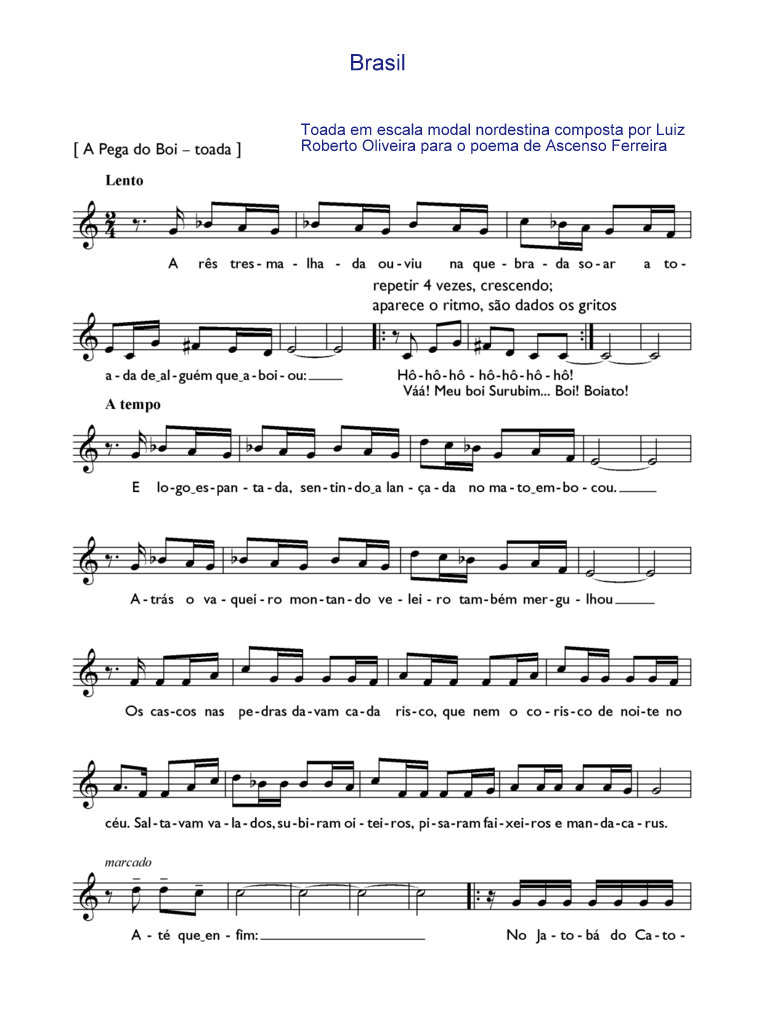
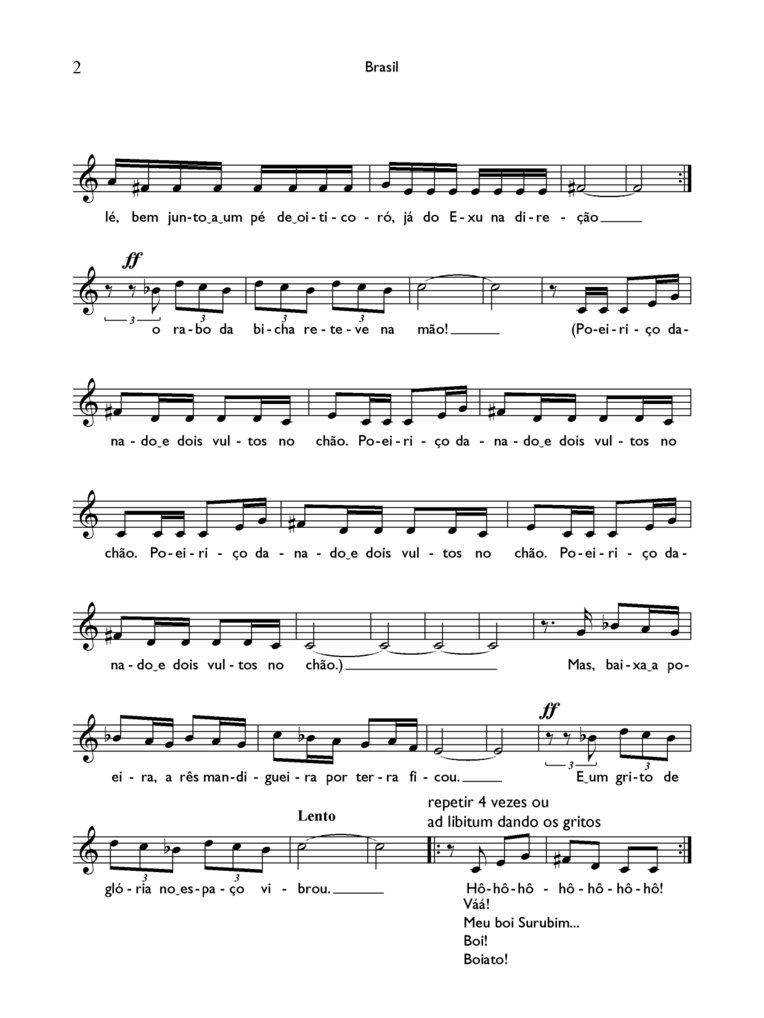
*1: CARVALHO, Ronald de. Ronald de Carvalho: Poetry and Prose. Rio de Janeiro: Livraria Agir Editora, 1977.
*2: NETO, Simões Lopes. Simões Lopes Neto. Rio de Janeiro: Livraria Agir Editora, 1977.
*3: LISBON, Henriqueta. Poetic Anthology: for Childhood and Youth. Rio de Janeiro: MEC / National Book Institute, 1961.
***


